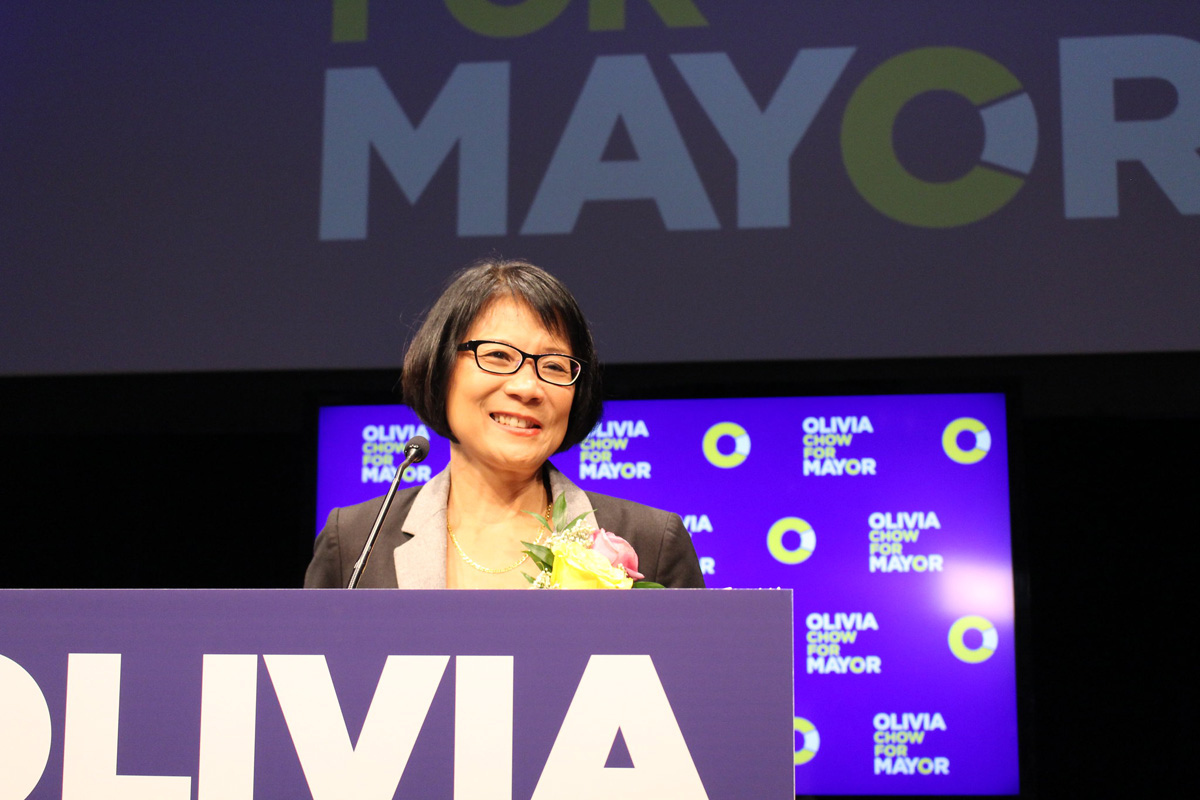Toronto’s New Progressive Mayor: Assessing Olivia Chow’s First Two Months in Office
September 25by Ian Xu
After a decade under conservative leadership, Canada’s largest city and economic capital once again has a progressive leader.
Mayor Olivia Chow, former NDP MP and ex-Toronto city councilor, assumed the position on July 12, stepping into the post with a wealth of experience in community organizing, city politics, and a previous assignment in the federal shadow cabinet.
Considering Toronto’s challenges have often been depicted as calamitous, it’s worth asking: how has Chow fared in her first two months of office?
A city in dire straits
Skyrocketing housing prices, unabating homelessness, the local effects of a Canada-wide drug overdose crisis, and a long-dysfunctional public transit system were hot-button issues in the July election—a significant departure from the relatively one-dimensional debates around city finances that defined her two immediate predecessors’ electoral showdowns and tenures.
Elected in 2010 on a platform of fiscal responsibility, Rob Ford cancelled a slate of ambitious infrastructure projects during his brief but turbulent four years in office.
His successor, John Tory—widely regarded as a consummate bureaucrat—kept City Hall lean with low municipal taxes throughout the majority of his nine-year tenure, but left a billion-dollar budget shortfall for Chow to deal with as a result of incurring emergency expenses during the COVID-19 pandemic. Incidentally, Tory defeated Chow in the 2014 Toronto mayoral elections.
Chow’s plan
Much of Chow’s platform includes expanded public investment, ostensibly to be funded through levying taxes on luxury property owners and speculators. Widow of the charismatic Jack Layton, Chow has maintained an upbeat tone extending from her policy platform to media appearances.
To lower housing prices in one of North America’s least-affordable cities, Chow has planned to build more rent-controlled homes with the city acting as a developer. She also plans to annually allocate $100 million to acquire, repair, and transfer rental apartment complexes to community land trusts.
In conjunction with her housing policies, Chow intends to tackle homelessness through providing rent supplements, increasing the number of accessible respite spaces, and creating complementary services in partnership with non-profits.
Expanding access to community crisis services is Chow’s proposed solution to escalating mental health and drug-related incidents. Some other candidates sought to push the courts to dispense more punitive sentences, along with putting out a hiring call for the Toronto Police Service, but Chow has strayed far away from those measures.
While transit construction in the province of Ontario is under the purview of provincial crown corporation Metrolinx, the Mayor’s office holds considerably sway over the trajectory of projects built on Toronto’s land. Chow has eschewed Toronto mayors’ tendency to cancel their predecessors’ flagship projects; instead, she’s focused on reversing recent service cuts and providing cell service underground.
Recent developments
Arguably the most significant development coming out of City Hall in the past few weeks has concerned Toronto’s fiscal policy, though other developments have made headlines.
Not long after stepping into office, Chow and Ontario Premier Doug Ford jointly called on the federal government to permanently increase funding towards resources for refugees and asylum- seekers.
What can only be described as latency between the mayor’s office and city staff has prevented asylum seekers from claiming shelter in emergency shelter spaces despite Chow passing a motion through council allowing them to do so (though city staff have since been explicitly instructed after reports of inaction surfaced in the media).
Chow managed to pass a new mansion tax through a city council that has rarely approved increased taxation of any kind, let alone on the city’s elite. The same council meeting also approved further exploration into other tax schemes—and pushing both the province and feds to do the same.
Tempering her legislative accomplishments, however, were reports that the city saw a spike in opioid-related overdose deaths to begin the month of September: 11 people died in one week alone, which Toronto’s public health agency describes as double the city’s weekly average. This happened concurrently during the week the city joined other jurisdictions in declaring August 31st as Overdose Awareness Day.
The city’s beleaguered transit system still bears witness to the odd violent outburst on subway cars, streetcars and buses alike. Line 3 on the subway is now permanently shuttered, months ahead of schedule thanks to a derailment, and will be replaced by more frequent bus service serving the northern area of Scarborough that the line once ran through.
Changing currents in Canadian politics?
Recent trends indicate that conservative parties and leaders are gaining traction across Canada.
Federal leader Pierre Poilievre is outperforming incumbent Prime Minister Justin Trudeau according to a recent Abacus Data poll; that same poll indicates that the federal Conservatives would trounce the governing Liberal Party, on the basis of the former’s popularity and thanks to vote-splitting on the left.
Additionally, eight out of ten provincial elections in the past three years have returned right-wing premiers who have maintained their popularity, in spite of substantial expert criticism excoriating governments’ responses to the COVID-19 pandemic.
Large cities are eschewing progressive candidates, in stark contrast with their tendency to vote on the left during provincial and federal elections. Kennedy Stewart, former mayor of Vancouver, resoundingly lost to business-friendly Ken Sim in early November 2022, a curious indication of discontent in a region known for supporting progressive policies. Similarly, Catherine McKenney’s October 2022 mayoral run in Ottawa was rejected by voters in favour of bike hawk Mark Sutcliffe.
It’s unclear as to whether or not Chow’s election is a rejection of these trends, or if it’s actually just a repeat of Canadians’ tendency to flip-flop between ideologies every decade or so. Or this might not even matter at all what with voter turnout decreasing every year. Regardless, if Chow delivers on her promises while stabilizing Toronto’s perilous finances—in Canada’s economic capital, no less, during a time of nationwide economic instability—it would undoubtedly lend the progressive agenda more credibility.
Photo courtesy of Olivia Chow via Flickr (CC BY 2.0)
Olivia Chow speaks at a campaign event during her 2014 Toronto mayoral campaign.






